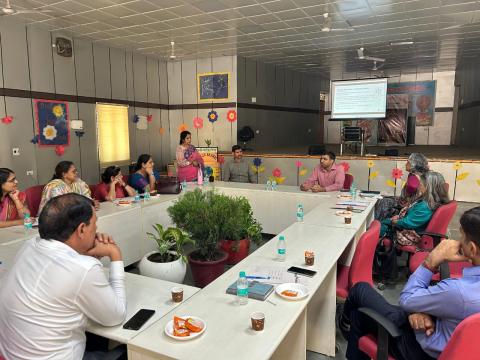
Breaking Isolation: The Benefits of Peer Learning in School Leadership
Most schools in India operate under significant resource constraints. Running these schools effectively in such conditions requires innovative approaches, which school leaders often demonstrate. Unfortunately, the institutions vested with the power to impart education often show reluctance to engage in mutual learning. However, the value of learning from one another has long been recognized. While the National Education Policy (NEP) does not explicitly promote a collective learning process, it does encourage the sharing of resources through the concept of school clusters.
In Delhi, the State Council of Educational Research and Training (SCERT), in collaboration with Creatnet Education, has been promoting this idea through the Cluster Leadership Development Program (CLDP). This program brings together school principals from nearby areas to form clusters and engage in day-long discussions. The unique aspect of the program is that the discussions are led by a fellow principal. Creatnet Education has anchored this program for over a decade, and it has proven to be instrumental in helping school leaders develop a shared understanding of common challenges and opportunities.
Schools often function in isolation, leading many principals to believe that the challenges they face are unique. However, when these issues are brought to a shared forum, they often discover that what they perceive as unique problems are, in fact, common challenges. This realization provides a sense of relief and fosters the development of collective knowledge.
The CLDP forum also offers an opportunity for principals to share their unique leadership initiatives with their peers. Peer recognition and validation are perhaps the highest forms of acknowledgment, and this platform provides that opportunity. Moreover, it subtly motivates principals to improve their practices and share their achievements. The stories that emerge from these sessions are often inspiring. For example, in one session, a principal shared that he was an alumnus of the same school he now leads. He has leveraged his network to mobilize resources for his school, driven by the passion to transform the lives of the children attending it. His dedication to gathering every possible resource for his students is a testament to his commitment.
In another instance, a principal described how he regularly acknowledges his teachers by issuing certificates that state, “I saw you doing [a specific good deed].” Stories like these showcase the innovative approaches discussed at these forums.
However, it is not difficult to notice the reluctance demonstrated by some participants. This reluctance reflects a deep-seated conditioning that perceives a principal’s time away from school as wasted. This mindset confines principals to their schools, limiting opportunities for professional growth and mutual learning. Yet, participation in these forums helps develop a shared narrative and ultimately benefits the schools they lead.
Programs like the CLDP demonstrate that collective learning and shared leadership can lead to innovative solutions and improved school management. By fostering connections and open discussions among school leaders, such programs create a network of support and a repository of collective wisdom that schools can draw upon. It is imperative for educational institutions to embrace the value of learning from peers and recognize that time invested in collaboration is not wasted but is, in fact, an investment in better leadership and improved educational outcomes for all students.
- Log in to post comments
